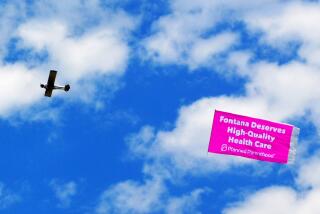Panel Avoids Birth Control in Urging School Clinic
- Share via
A proposal to put a health clinic in a San Diego city school cleared its first hurdle Thursday night when a subcommittee of the task force studying the issue supported the establishment of a school-based facility.
However, the subcommittee offered no recommendation on the proposed clinic’s most controversial aspect--the suggestion by school health officials that it dispense contraceptives to students.
The subcommittee’s recommendation will go before the full task force on Thursday. The task force can approve, reject or change the recommendation before sending it to the Board of Education for consideration on July 1.
School-based health clinics, which would handle teens’ routine medical needs as well as distribute contraceptives, have become the San Diego Unified School District’s most volatile issue this year.
The school district has received scores of letters on the subject, most of them opposed to the idea of a clinic that would offer contraceptives. Some of the most vocal opposition has come from anti-abortion and religious groups. Last month, Catholic Bishop of San Diego Leo T. Maher endorsed a one-day boycott of city schools to protest the proposal.
The subcommittee offered no recommendation on whether contraceptives should be distributed at a clinic. James Kaupp, the district’s assistant superintendent for educational services and chairman of the task force, said that the full 30-member panel may not offer any recommendation on that issue even if it ultimately recommends that the board establish a school-based health clinic.
But the subcommittee did compile a list of statistics that its members believe demonstrates the need for a health facility. Included in that list are data showing that the number of city schools students arrested for drug-related offenses leaped 1,272% in the past three years, and that 47% to 88% of the students referred by school nurses for medical procedures such as vision and hearing screening did not appear to receive the care.
The task force concluded that one-third of the children born to county teen-agers were in three neighborhoods of the city--Southeast, Mid-City and the central core. However, school nurses listed teen pregnancies eighth on a list of adolescents’ health concerns in a survey taken by the task force.
The subcommittee also decided that it was unable to conclude if adequate resources already exist to provide health care to teens.
“I think we have demonstrated that something has to be done,” said Nancy Siemers, social concerns education coordinator for the school district, and a task force member. “I think what we are doing now doesn’t cut it.
“I’m not saying your kid has to go,” Siemers told Dale Larson, the lone subcommittee member voting against the clinic. “But when I see an 11- or 12-year-old making a baby, that hurts. So my recommendation is let’s go for it.”
The seven-member subcommittee voted 4-1 for the proposal. The two absent members will be polled by telephone, but their vote cannot change the outcome.
Larson, appointed to the task force by school board member Larry Lester, said he voted against the clinic because he believes that “if (a clinic) gets in, whether it happens this year or it happens next year, Planned Parenthood is going to get in there.” He also said such clinics are “a further encroachment into the parental authority over the family.”
More to Read
Sign up for Essential California
The most important California stories and recommendations in your inbox every morning.
You may occasionally receive promotional content from the Los Angeles Times.













